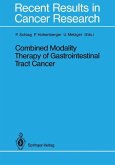Primary malignant tumors of the gastrointestinal tract account for 23% of all invasive cancers and 24% of all the deaths in 1988. In the United States, the American Cancer Society estimates that there will be 227500 new cases of gastrointestinal malignancy di agnosed, with 122350 deaths. This includes 9800 new cases of carcinomas of the esopha gus, 24800 carcinomas of the stomach, 2500 new cases of malignant tumors of the small intestine, 105000 new cases of tumors of the large intestine, and 42000 new cases of car cinoma of the rectum, 14000 new cases involving the liver and biliary passages, 27000 new cases of carcinoma of the pancreas, and 2400 other unspecified digestive tract ma lignancies. This combined incidence is second only to the number of new cases of lung cancer. Bleeding from the gastrointestinal tract represents one of the earliest findings with re gard to malignancy of the gastrointestinal tract. In general, personal or family history of colon and rectal cancer, personal or family history of polyps in the colon or rectum, or inflammatory bowel disease are high risk factors with regard to tumors in these loca tions. Dietary behavior is also important in that a diet high in fat and/or low in fiber content may be a significant causative factor.








